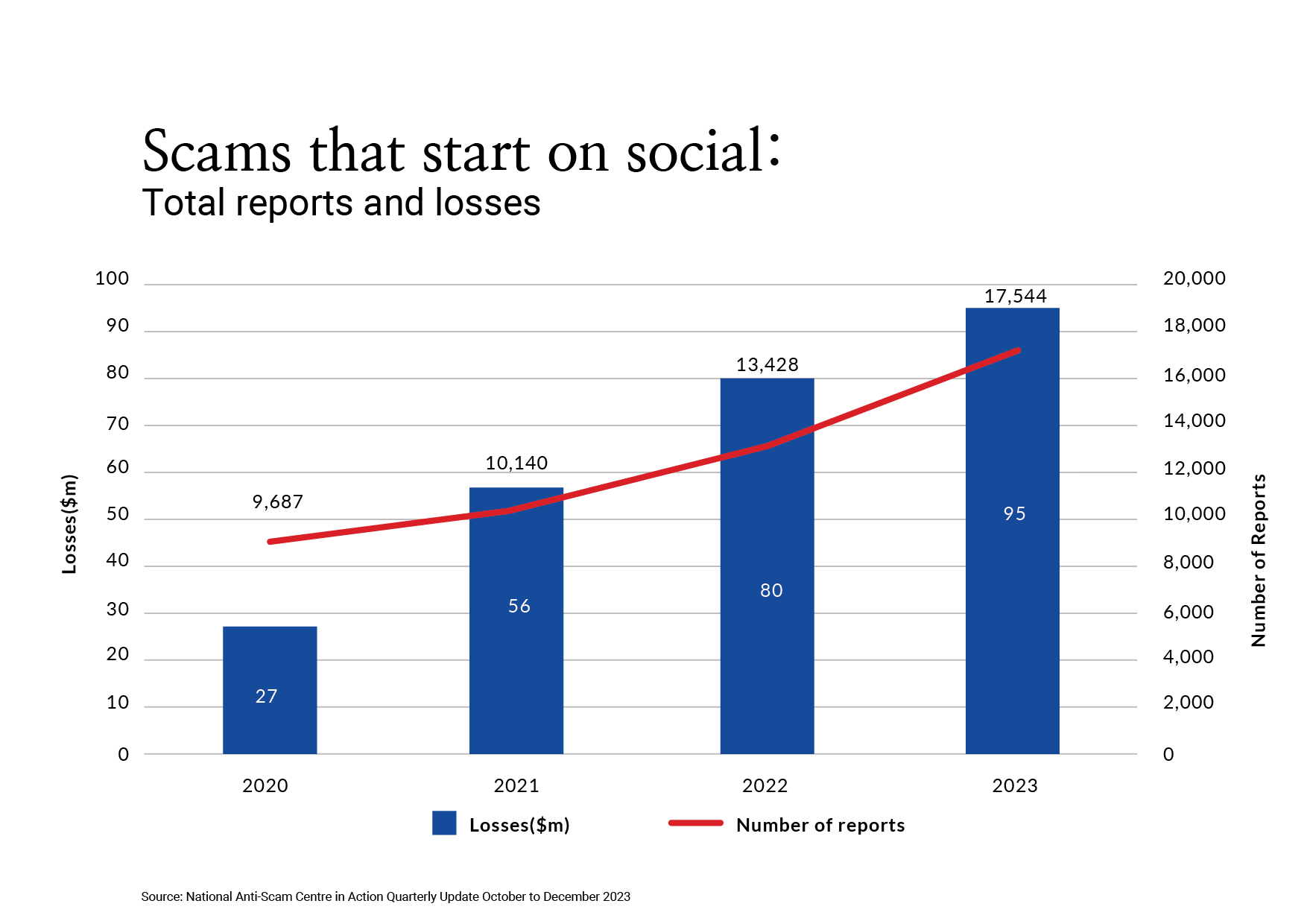Suggested Search
Cyber criminals are targeting people based on personal details and preferences – and reeling them in with professional-looking follow-ups. Find out how to protect yourself.
Next time you like or follow a friend – or a brand – on social media, keep in mind that it may not be just your friends and family who are watching.
The personal nature of posts and other activity on social media provides would-be fraudsters with lots of detailed information about people, their connections and their personal preferences.
Even seemingly harmless posts, messages, photos or videos can be used to develop detailed profiles of people, according to the Australian Cyber Security Centre.
Swindlers may use that information to try to scam you by tricking you into handing over money or personal details online.
Social cybercrime costing Aussies millions
Losses to social media scams reached $95 million in calendar year 2023, an increase of 19% compared with the $80 million lost in 2022.
This figure had been increasing dramatically, up from reported losses of $56 million in 2021 and $27 million in 2020.
In the December quarter last year alone, reported scams originating on social cost Australians $15.9 million.

Scams are more likely to affect older Australians
All age groups report being affected by scams. However, the likelihood that people could be targeted on social networks appears to increase for older Australians.
Those aged over 65 experienced the highest losses of any age group to cybercrime originating on social networks, reporting 30% of all such incidents.
This represents a 57% increase compared with the previous quarter for this age group.
People in this age bracket were also most affected by investment scams, as well as dating and romance scams.
What to look out for when it comes to scams
Scams that start on social networks can take many forms.
Many of those who were contacted on social media report that they were targeted with an ad, a post, or a message on an online forum.
According to the Australian Competition and Consumer Commission (ACCC), some people reported placing an order after seeing an ad, but never receiving their goods. Others reported seeing advertisements that appeared to be from a real, online retailer.
The biggest proportion of losses came from contact that originated via WhatsApp (47% of losses) and Facebook (20%), according to the ACCC). This was followed by Instagram (9%), as well as online dating sites (9%).
Scammers may use sophisticated tactics
Scammers have also been known to use social media to create fake news stories, sometimes featuring well-known celebrities who appeared to endorse investment opportunities.
In some cases, people were followed up with personalised, highly professional-looking communications that appeared to be legitimate.
Dating sites may also be involved. After pretending to be a real person who wants a relationship with you, often over many weeks or months, a scammer may ask you to invest your money or cryptocurrency in 'opportunities' that turn out to be fake.
How scammers use personal data to target people
In many cases, scammers use personal, highly sensitive data to trick people into making fraudulent online payments.
In one example reported to the ACCC, people received a friend request on Facebook featuring an actual funeral notice that had originally been shared by a legitimate account.
They were asked to help the bereaved family pay for a live stream of the funeral by making a credit card payment to a funeral streaming account.
Remember, CFS will never send you an email asking for your bank or account details.
Staying safe from scammers online
The CFS Staying safe online hub contains more tips and resources to help you avoid scams, such as:
- If you think a phone call sounds suspicious, hang up
- Never share passwords or personal information, especially with someone you don’t know
- Don’t open SMS or email links or attachments unless you know who they’re from
- Protect your computer with antivirus software
- Don’t send money or personal details to people from unusual locations
- Don't accept a message or friend request on social media from someone you don't know
- Be wary of unexpected contact, particularly if you’ve replied to something online
- Do your own checks on any investment opportunity to make sure it's real
- Beware of promises of low risks with high returns
- Consider seeking independent financial advice before you invest
- Check your bank account and statements regularly to watch out for unusual activity.
More information and recommendations for safe social media use are available at the Australian Cyber Security Centre.
CFS works hard to prevent members from being targeted by scammers. If we become aware of any scams that may affect our members, information will be provided at the top of our Contact Us page.
How to report a scam
Reporting scams helps others avoid being scammed in the same way.
If you think you may have been targeted by scammers, contact us on 13 13 36 and change your passwords.
You can also report scams to Scamwatch online.
And you can get assistance by contacting Australia and New Zealand’s national identity and cyber support service IDCARE. They can help you make a plan to limit the damage and support you through the process.
Tools and Resources

Tips to avoid investment scams
Cyber security awareness month is a good annual reminder to get yourself across trending scams, and ways you can protect yourself and your money.

Staying safe online hub
From 1 January 2024, the more generous incentives temporarily offered to working pensioners via the Work Bonus will be permanent.

Manage your accounts on the go
If you don't have an adviser but would like some advice, you can use our find an adviser service to locate one near you.
Unleash in ways you never thought possible
Get in touch
Get in touch with us online or call us
8:30am to 6pm AEST Monday to Friday.
Find a financial adviser
Use our tool to find professional financial advice,
local to you.
Download mobile app
Track your balance and see your
transactions history from anywhere.
Avanteos Investments Limited ABN 20 096 259 979, AFSL 245531 (AIL) is the trustee of the Colonial First State FirstChoice Superannuation Trust ABN 26 458 298 557 and issuer of FirstChoice range of super and pension products. Colonial First State Investments Limited ABN 98 002 348 352, AFSL 232468 (CFSIL) is the responsible entity and issuer of products made available under FirstChoice Investments and FirstChoice Wholesale Investments.
Information on this webpage is provided by AIL and CFSIL. It may include general advice but does not consider your individual objectives, financial situation, needs or tax circumstances. You can find the target market determinations (TMD) for our financial products at https://www.cfs.com.au/tmd which include a description of who a financial product might suit. You should read the relevant Product Disclosure Statement (PDS) and Financial Services Guide (FSG) carefully, assess whether the information is appropriate for you, and consider talking to a financial adviser before making an investment decision. You can get the PDS and FSG at www.cfs.com.au or by calling us on 13 13 36.


